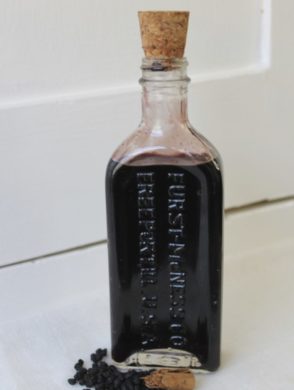The Magic Elixir That is Elderberry Syrup (and How to Make It)

Elderberry syrup. There has been a recent rise in store-bought brands and availability of this syrup, and for good reason! If you haven’t heard about it already, elderberry syrup has been proven to be effective in reducing symptoms for influenza A and B as well as common colds, and can even prevent viral infections by stimulating the immune response! Dr. Madeleine Mumcuoglu, a world-renowned virologist, found that it’s effective against all types of flu viruses that were tested, showing better results than even the flu shot!
What??? A plant from nature can keep us safer and healthier than lab-created medications? How can this be? Because Mother Nature is awesome. Period. Mic drop. End of story.
On that beautiful note, let’s talk about how to make this seemingly miraculous concoction in the comfort of our very own kitchens using this elderberry syrup DIY recipe.
Elderberry Syrup DIY Recipe Ingredients
Note: If possible, use organic ingredients.
- 3 1/2 cups filtered water
- 2/3 cup dried elderberries (or 1 1/3 cup fresh or frozen)
- 2 tablespoons grated ginger (or 1 teaspoon dried ginger)
- 1 tsp cinnamon (or 1 whole stick)
- 1/2 tsp ground cloves (or 2-3 whole cloves)
- 1 cup raw honey (added after cooking and cooling)
Elderberry Syrup DIY Recipe Directions
- Put the water, elderberries, ginger, cinnamon, and cloves in a saucepan. (Do NOT put in honey. When heated, honey’s enzymes, minerals and nutrients are either weakened or destroyed, having no healing qualities any more.)
- Bring to a boil, then reduce to a simmer and cover for 45 minutes to an hour, until the liquid has reduced by almost half.
- Remove from heat and leave it to cool until it can be handled.
- Mash the berries carefully.
- Pour through a strainer into a glass bowl or jar.
- Discard the elderberries and let cool until lukewarm.
- When it is no longer hot, add the honey.
- Once the honey is sufficiently mixed in, store in a mason jar in the fridge.
And there you have it! Your own magic elixir at your own hand, and at a less-expensive cost, both monetarily and physically.
It should be noted that parts of an elderberry plant can be toxic, including the berries. The reason the berries can be healing? Because they are cooked–they MUST BE cooked (like simmering in water, for example).
As far as doses go, you should ask your naturopath or herbalist. I personally take a teaspoon each day for maintaining health, and I will usually take 3-4 teaspoons if fighting a sickness. The consensus for giving it to children is: Ages 4 and up: one teaspoon daily for maintenance. Ages 1-3: 1/4-1/2 teaspoon for daily maintenance.
If you are unsure about making this syrup yourself and would feel more comfortable buying one that has been tested and handled safely, please check out this elderberry syrup or elderberry gummies! The brand Sambucol was created by Dr. Madeleine Mumcuoglu and is the syrup most scientifically researched. For kids, there is not enough evidence to determine if there are negative side effects, however there are several companies that make elderberry syrup and gummies for children. (If you would prefer an organic syrup, try this one!)
I hope you find yourself and your family healthy, happy, and illness-free after a good dose of elderberry syrup!
For additional questions about the use of elderberries, please support Wellness Mama as a wonderful resource!
Here is a round-up of products mentioned in the article for your shopping convenience!
You can click the button below to go back to the Immune Support articles, or you can venture over to our DIY Immune Support recipes and the Immune Support supplies and products we love!
Disclaimer: All information contained herein is intended for educational purposes only. It is not provided to diagnose, prevent, or treat any disease, illness, or injured condition for any human or animal, and Mother Nature’s Truths, as well as the author(s), contributor(s), publishers, and owners accept no responsibility for such use. Anyone suffering from any disease, illness, or injury, or who has an animal suffering from such, should consult with their physician or veterinarian. The statements herein have not been evaluated by the Food and Drug Administration.